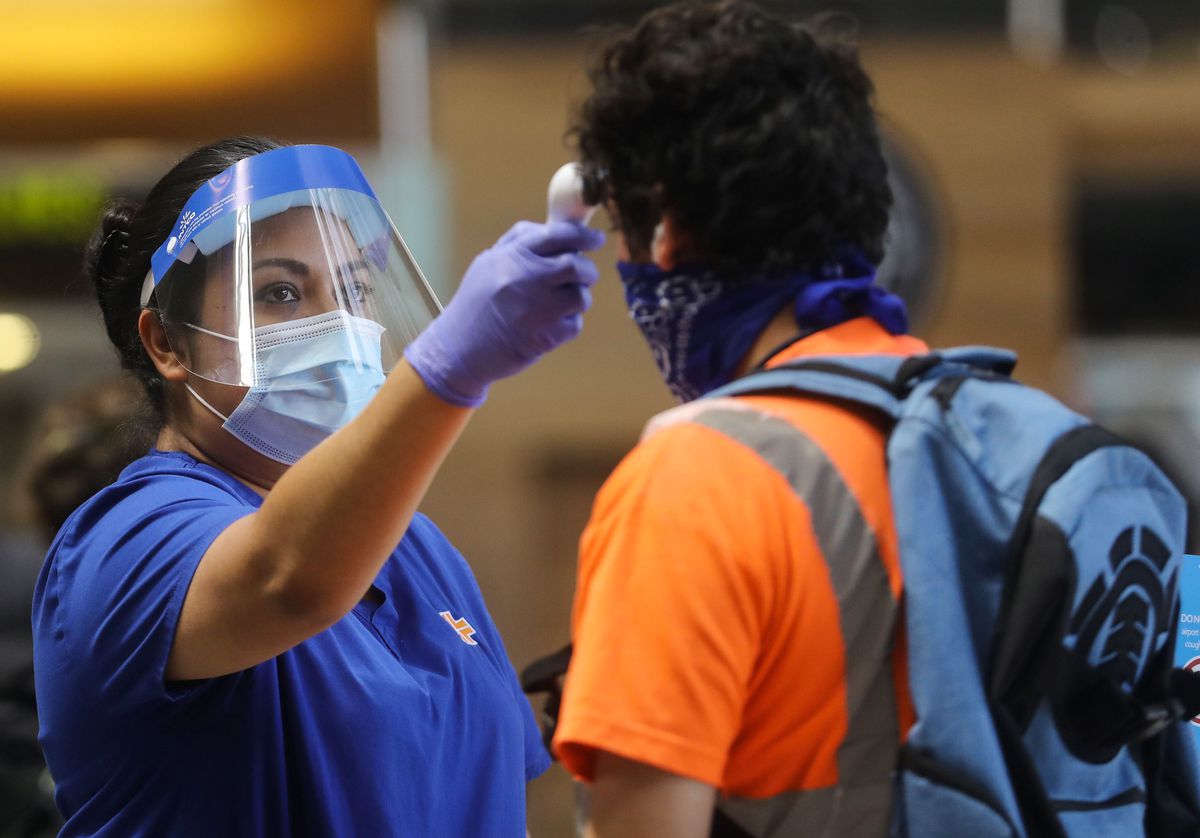There was a brief period from about late March to mid-May, during the first spike in coronavirus cases in the US, when domestic air travel virtually ground to a halt. Only about 100,000 people were traveling per day, compared to the pre-pandemic rate of more than 2 million daily travelers. Some flyers were greeted with nearly empty planes. Then, as states started to open up, the number of flyers began to rise significantly, averaging about 575,000 per day for the last week of June, with little sign of slowdown.
“There is clearly a segment of the traveling public who is ready to go,” Spirit Airlines CEO Ted Christie told USA Today, as the budget carrier prepares to increase its daily flight offerings. It’s likely a rash call to declare that people are “ready to go” anywhere, as there are more than 2.6 million coronavirus cases in the US as of June 30. After months of staying indoors, however, many Americans are growing restless.
A survey of more than 4,700 Americans from the Pew Research Center, taken from June 16 to 22, found that 40 percent of people believe the worst of the pandemic is over, up from 26 percent in early April. Some are making summer travel plans — despite warnings from public health experts, who predicted it will be much harder to go back to lockdown the second time around.
Whether summer travel is safe or even feasible depends on a variety of factors: location, length of trip, transportation methods, and the number of people you encounter and are with during your vacation. I’ve previously written about how there’s virtually no risk-free mode of transportation, whether you’re simply commuting to work or taking a short weekend trip. Chances are, if you have to share a space with strangers in close proximity, there’s an increased likelihood of catching or transmitting the virus. Still, with summer in full swing, people are inevitably going to travel. What’s important is how they travel and whether they’ve considered options that can mitigate both personal and community risks.
So where can you actually travel to? The federal government has refrained from declaring any domestic travel restrictions so far, which means Americans (even those in places with rising Covid-19 cases) are still able to move about and cross state borders. Given how most states have at least partly reopened again, individual choice matters — especially when it comes to travel. The US is witnessing an alarming surge in coronavirus cases, and it’s clear that certain states and regions have handled the outbreak more vigilantly than others. Early hot spots like New York, Maryland, and Massachusetts are seeing either a plateau or a decline in Covid-19 cases with widespread testing available. Meanwhile, states like Arizona, Florida, and Texas are starting to become overwhelmed and scrambling to accommodate a surge in patients.
Some states, like New York, New Jersey, and Connecticut, are starting to require visitors from certain hot spots to self-quarantine for 14 days, threatening to fine those caught flouting the rules. Alaska also requires visitors from another state or country to self-quarantine for 14 days upon arrival or take a test prior to arrival.
The European Union, which plans to open its borders starting July 1, is reportedly excluding travelers from countries like the US and Russia from traveling to the region, highlighting the US’s inability to contain the virus. And the Asia-Pacific region has begun establishing “travel bubbles” with select countries to offer limited travel without considering the US. As a result, most Americans will probably be out of luck when it comes to planning international trips, likely until 2021.
“For years, the American passport has been one of the most powerful in the world,” said Annie Erling Gofus, founder of the travel consultancy Wunderbird. “Before the pandemic, there were very few places that we can’t go to or need visas to travel to, and all of a sudden, we’re essentially grounded and stuck at home.”
Erling Gofus had ceased coordinating trips for most of her clients in late March, although in recent weeks, several have reached out for help planning vacations to Europe in the fall. While she said she was initially surprised at these requests, which primarily came from clients who lived in the Midwest, Erling Gofus told me she’s “relatively confident” Europe won’t reopen travel to American citizens until it’s safe to do so. Domestic travel, she said, appears to be more concerning at the moment.
“This summer, I suspect we’re going to see a lot of good airfare deals domestically that are going to entice us to get back in the air,” she said. “Obviously, US airlines have been hurting, but we’re still seeing an increase in Covid-19 cases nationwide.”
In late June, United and American Airlines announced that they will begin booking flights to full capacity in July, effectively ending any efforts at social distancing aboard its aircraft, even if passengers and crew are still required to wear masks. (Delta is still blocking middle seats through September and reducing seat capacity by about 50 to 60 percent.)
“Airplanes don’t have social distancing … but an airplane environment is incredibly safe,” said United CEO Scott Kirby in late May, when the airline was under scrutiny for not blocking some middle seats on its flights.
Although an aircraft’s ventilation might prevent droplets from spreading very far, additional measures, like wearing masks and reducing seat capacity to spread passengers apart, will further reduce the risk of transmission during a flight. (On a subreddit specifically for flight attendants, some have said that although masks are required under airline policy, the crew are only “informers, not enforcers” when it comes to the rules. Usually, the captain makes the final call of whether to keep a passenger on.)
It’s true that empty middle seats on a plane likely won’t be enough to stop the coronavirus from spreading, but by filling a plane to 100 percent capacity, an airline will increase the likelihood that a sick person can be on board.
TuAnh Dam, a recent graduate of the Columbia School of Journalism, was supposed to take a Southwest flight out of New York City to Houston, Texas, on June 29. She has plans to move to Houston for a post-grad internship, but after seeing the state’s surge in cases, she pushed her flight to July 10. While Southwest is continuing to limit the number of seats sold on each flight through July, Dam is still worried about getting on board.
“I’m already scared and nervous to fly a flight that isn’t capacity,” she told me. “I wouldn’t fly a full flight right now. There could be asymptomatic carriers, or people who might not care about the rules.” It’s frustrating to survive a brief lockdown period in New York, she said, only to willingly travel to another one months later: “I’m flying because I have to relocate for a job, but it worries me that people could be traveling for fun.”
Given the current state of the pandemic, Erling Gofus, the travel consultant, told me she isn’t personally comfortable taking any domestic flights, although she has considered taking a short road trip somewhere nearby. Americans generally appear to be most comfortable traveling by car, rather than by plane or train. According to a survey by MMGY Travel Intelligence, 67 percent of responders plan to travel by car during the next six months, and a third of this group are willing to drive 300 or more miles one way to reach their destination.

“The instinct now, for people who would typically fly to their destination, would be to get in your car and drive to different places,” Erling Gofus said. However, she urges people to consider the length of their trip, the number of pit stops they take, and potential activities that could expose them to other travelers, even something as simple as using the bathroom. “My family is from North Dakota, and driving there would require me to make frequent stops at gas stations and use bathrooms with questionable cleanliness,” she said.
For those on the road this summer, it’s important to research ahead of time or inquire about specific policies, such as whether a hotel will have decreased occupancy or a longer vacancy period between guest departures. “People probably need to do some homework beforehand to ensure they’re going to places that are complying with basic public health recommendations,” said Alan Katz, a professor of epidemiology at the University of Hawaii.
Most hotels and Airbnbs have implemented coronavirus safety policies by setting higher standards for cleanliness and introducing new cleaning technologies, like electrostatic disinfectant sprayers. For example, Airbnb is introducing a new that will inform guests if their hosts are abiding by that process; if not, there is an option for hosts to have a 72-hour booking buffer between guests to reduce the risk of exposure to the virus, which could linger on surfaces for up to three days.
Many hotels and short-term rentals are taking safety precautions to reduce interactions between visitors and staff through measures like contactless check-ins. Regardless, you should continue to wear a mask and try to interact only with those in your social bubble, Katz said. This is for not just your own well-being but that of everyone you encounter, including hotel workers.
Some hospitality workers are speaking out and even suing their employers for not enacting significant protections. Recently, the unions representing Las Vegas casino workers filed suit against resort operators, alleging that the companies’ policies have endangered employees. Workers in Los Angeles are also worried about the sudden reopening of hotels in the county, which reportedly provided the companies less than 24 hours to train staff on health protocols.
John Marroni of National Restoration, a disaster recovery company that works with hotels, told Business Insider that guests can figure out if a hotel room has been properly cleaned by checking certain areas, like the bathroom or heating vents, to make sure they’re free of dust and dirt. “[Hotels] should each have some kind of certificate that indicates the place has been disinfected,” he added.
While a person could technically catch Covid-19 by touching an infected object, Katz told me “that’s not a major route of transmission.” The most important thing to keep in mind wherever you’re heading, he said, is close proximity to others. “People are no longer as focused on simple behaviors that can really have dramatic impacts on mitigating transmission,” he said. “Even here in Hawaii, we’ve seen people not being as diligent as they should be, and when you start bringing in more people from other locales, that could be very dangerous.”
(Hawaii, which has largely managed to suppress the spread of the coronavirus, is planning to reopen its tourism industry to out-of-state travelers starting August 1. However, the state government is still finalizing the details of the plan, which could include a test-based approach for visitors, much like Alaska.)
It’s understandable that travelers — and certainly the tourism industry — are eager to bounce back and resume planning vacations and trips after a months-long hiatus. Still, the focus should be on risk mitigation. Think about where you’re going to eat, whom you’ll encounter, and whether those interactions can be minimized. “Travel may reopen, but we’ll see whether airlines will be able to pack planes or have full bookings at resorts,” Katz said. “I would hope people are still concerned and thinking about the risks.”
Support Vox’s explanatory journalism
Every day at Vox, we aim to answer your most important questions and provide you, and our audience around the world, with information that has the power to save lives. Our mission has never been more vital than it is in this moment: to empower you through understanding. Vox’s work is reaching more people than ever, but our distinctive brand of explanatory journalism takes resources — particularly during a pandemic and an economic downturn. Your financial contribution will not constitute a donation, but it will enable our staff to continue to offer free articles, videos, and podcasts at the quality and volume that this moment requires. Please consider making a contribution to Vox today.
Posts from the same category:
- None Found









